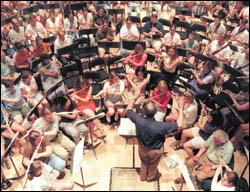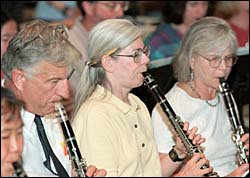The sweet sounds of summer

As Tom Everett mounts the podium and surveys the room, his commanding presence attracts the gaze of more than 100 attentive and anxious musicians awaiting his direction. It is a summertime Wednesday evening. The setting is the elegant Lowell Lecture Hall, and the players are members of the Harvard Summer School Pops Band.
This is not your typical band. Its members are young and old, widowers and housewives, students and professionals. Some are recent high school graduates. Others are retired. Many have played their instruments for years. Some are just beginners. Only one common denominator brings all of these people together: their shared love for music.
Everett launched the all-inclusive summer band 28 years ago, shortly after he was named director of the Harvard University Band. “I suggested a group that would be open to anyone, regardless of where they were from, regardless of age, regardless of musical experience, and nobody would be turned away,” he says.

“I explained that, besides music being such an important force in our lives and stimulating parts of the brain that chemistry does not, and indeed balancing our lives, every person, regardless of their technique, should have the opportunity to express themselves and be involved in something creative,” Everett explains. “If someone wants to see what it’s like to play music in a group, there should be someplace for them to go.”
Despite Everett’s belief that the idea wouldn’t fly, Thomas Crooks, then-Director of the Harvard Summer School, supported the concept and the band was formed in the summer of 1972. The first rehearsal drew about 20 people. Then word spread, and attendance doubled for the second session. As the years have passed, the numbers have continued to grow. The band has never held auditions. Everyone who wants to play can.

Evelyn Tate ’74 joined the group in its first year as an undergraduate clarinet player because it was a “great way to stay in shape over the summer.” Now a computer engineer living in Sudbury, Tate remains an active member who looks forward to dusting off her old clarinet case every June.
“There aren’t that many opportunities for people to play who aren’t part of a regular organized group,” Tate says. “The thing I like about this band is that it’s open to anybody in the community, so that if you can’t play with a year-round organization, you can still join this group and have a lot of fun for the six or eight weeks that we play in the summer.”
According to Everett, the band is typically split evenly between newcomers and veterans. A show of hands at a recent rehearsal indicated that about 20 members have played with the group for at least five years, and a dozen or so have been tooting their horns or blowing their flutes with the Harvard Summer School Pops Band for more than a decade.
For some members, the band is also a family affair. Rachel Spiller, who was raised in Cambridge and still lives in the city, joined the ensemble along with her mother in the early 1970s. “We got involved because my brother was an undergraduate at Harvard and was playing in the marching band during the year,” she explains. “He told us about the new summer band starting up and that it was open to anybody. He pondered it, then decided it was okay for his mother and sister to come too.”
Spiller, who later founded the Cambridge Symphony Orchestra, has only missed one season with the Pops Band. “The summer band is a lot of fun, in large part because of Tom and what he gives to the musicians, so I keep coming back,” she says.
Retired engineer Bob Piankian is another familiar face at Lowell Hall. He joined the band as a relative novice nine years ago, at the urging of his wife who is also a member. Now, Piankian spends much of his rehearsal time instructing the newest players.
“It was quite a challenge, a thrill, and a fearful thing to get into when I could barely make out the notes on a page in a simple étude book,” Piankian explains. “Yet the warmth of Tom and of the other players in the group, who welcome [newcomers] who are rank beginners, was heartwarming to see and feel I learned to grow, to see what it was like to play in a band, to play what I could, and to not be afraid of not playing what I couldn’t.”
Everett keeps the rehearsals entertaining but focused, with an emphasis on channeling the creative energy in the room into a cohesive sound. “To me, music is a personal challenge your goal shouldn’t be to play better than someone else,” he says. “Your goal should be to understand a piece better, to have more insight to expand your listening skills, your abilities, to play it better each time.
“That’s the premise that the group is built on no matter what level someone brings to the group … they’re expected to bring it up by the end of the summer.”
The Pops Band concludes its season with a concert along the Esplanade in Boston. “We’ve been playing at the Hatch Shell every year since the summer of 1973,” Everett says. “We are the largest group to play [there] each year. And for some of these people, this is the first time they’ve performed in public.”
Notwithstanding his own frayed nerves at the prospect of playing before thousands of people after just a handful of rehearsals, Everett says both he and the band usually rise to the occasion. “This is a public performance, and I don’t want to be associated with anything that’s not top-notch, and yet, after that concert, I love it. I feel energized.”
Preceding its Aug. 5, 7 p.m., concert at the Hatch Shell, the band will tune-up with a performance at Harvard Yard on Aug. 2 at 4 p.m. Both events are free and open to the public. Music lovers who attend should not expect to hear the Boston Pops or the Boston Symphony Orchestra, but Everett has no apologies.
“I have often felt that this group is unique, because it doesn’t fit [any specific label]. On paper, it may seen very amateurish,” Everett explains. “Well, it is exactly amateurish. An amateur is someone who enjoys making music, and does it for the love of music, not for payment, not for grade, not for any other reward except for what the music provides. And so this is an amateur group in the best sense.




